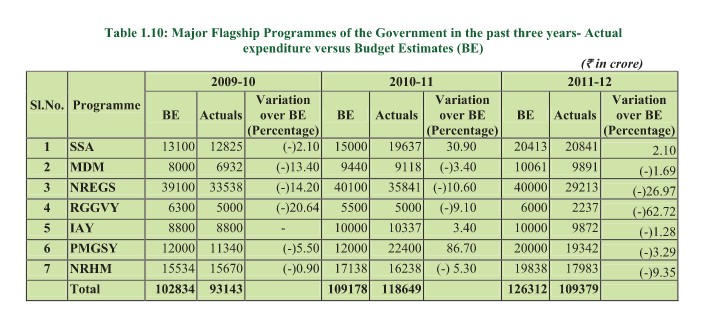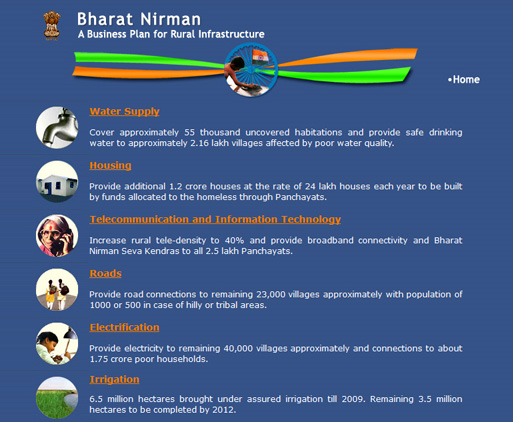Joseph Goebbels, German politician and Reich Minister of Propaganda, famously said that "...if you tell a lie big enough and keep repeating it, people will eventually come to believe it." Eventually, of course, the truth does come out, notwithstanding all the propaganda. Something like that can be said about the tall claims of the Bharat Nirman program. For all the claims made by the government about its flagship welfare schemes, the actual implementation of the schemes tells a different story from what the Ministry of Information and Broadcasting would have us believe.
The ministry is presently trying its best to dress up the UPA's image by rebranding Bharat Nirman (http://bharat-nirman.in/). Going by recent reports, however, the truth is quite different. The claims of the second phase of the Bharat Nirman campaign - as articulated in 'Glimpses of the India Story' that glorifies the past achievements of the UPA Government in sectors like education, health, telecom and infrastructure - have been punctured by the CAG financial audit report of the Union Government Accounts (2011-12) and the Parliamentary Standing Committee report on Implementation of MGNREGA, 2005.
The CAG report, tabled in Parliament on 13 August, 2013, presents a sordid picture of the spending on flagship schemes by the UPA. A similar picture on NREGA spending is demonstrated by the Standing Committee report, which was presented to the Lok Sabha on 14 August, 2013.
CAG report on financial audit
The CAG Report No.1 of 2013 - Union Government (Financial Audit) finds that the total expenditure on the UPA's seven flagship schemes increased from Rs.93,143 crore in 2009-10 to Rs.118,649 crore in 2010-11, but then decreased to Rs.109,379 crore in 2011-12. These schemes are the Sarva Siksha Abhiyan (SSA), the Mid Day Meal Scheme (MDMS), the Mahatma Gandhi National Rural Employment Guarantee Scheme (MGNREGS), the Rajiv Gandhi Gramin Vidyutikaran Yojana (RGGVY), the Indira Awas Yojana (IAY), the Pradhan Mantri Gram Sadak Yojana (PMGSY) and finally, the National Rural Health Mission (NRHM).
Compared with the budgetary allocation of Rs.126,312 crore for these seven flagship schemes in 2011-12, the actual spend during the same year therefore turns out to be 13 per cent less.
Among these, major schemes like MGNREGS, RGGVY, IAY and PMGSY have witnessed a decline in expenditure when compared to the previous year and also in comparison to the Budget estimates. For example, the actual spending on MGNREGS was Rs.29,213 crore in 2011-12 as compared to Rs.35,841 crore in 2010-11. In 2011-12, Rs.40,000 crore was allocated under the Union Budget for MGNREGS but actual spending on the same was almost 27 per cent less i.e. Rs.29,213 crore. A similar trend could be noticed in the case of RGGVY, IAY and PMGSY.

Expenditure on flagship programmes
(Source: Chapter 1: An overview of Union Finances 2011-2012, Report no.-1 of 2013-Union
Government (Financial Audit), click
to read.
Standing Committee report on unutilised funds
The 42nd Standing Committee Report (2012-13) on Rural Development entitled Implementation of MGNREGA, 2005 also noted that even though Rs.263,182.70 crore was available for implementation of MGNREGA works from 2006-07 to 2012-13, implementing agencies could utilise only Rs.195,321.03 crore during these years.
The Department of Rural Development (under MoRD) has furnished data that shows unspent amounts as a percentage of total available funds under the MGNREGA. This stood at 26.92 per cent during 2006-07, 18.01 per cent during 2007-08, 27.13 per cent during 2008-09, 23.54 per cent during 2009-10, 27.31 per cent during 2010-11, 22.11 per cent during 2011-12 (provisional) and 32.82 per cent during 2012-13 (as on 30.01.2013).

Promises made under the Indian Government's Bharat Nirman plan.
Economic woes
Widely criticised for alleged governance failure and corruption, the UPA Government at the centre is keen before the Parliamentary elections to present a positive image associated with its rule. But campaigns such as Bharat Nirman can hardly hope to throw a veil over its actual performance on various fronts.
Even the most ingeniously devised advertisement cannot hide the distress in the economy. The annual rate of inflation in August 2013 (over August last year) in terms of Wholesale Price Index (WPI) of food articles stands at 18.2 percent whereas the same for food and beverages in terms of Consumer Price Index (combined) is at 11.06 percent.
As per the 4th advanced estimates released by the Department of Agriculture & Cooperation on 22 July 2013, food grain production stood at 255.36 million tonnes in 2012-13 as compared to 259.29 million tonnes (final estimates) in 2011-12. During the first quarter of 2013-14, the real GDP (at factor cost) grew by 4.4 percent (over previous year Q1) as compared to 5.4 percent during the first quarter of 2012-13 (over previous year Q1).
One other thing of note. In the light of facts above, it would not be right to say that huge expenditures made on unproductive social schemes is bringing the economy to the brink of disaster, as has been alleged by many. In reality, the Government has failed to deliver what it promised to the nation during various budgets and has consistently neglected the recommendations of various CAG reports and documents prepared by Standing Committees on key schemes. Not something that the Bharat Nirman campaign can easily wash away.
References:
- CAG Report No. 1 of 2013-Union Government (Financial Audit)
- Implementation of MGNREGA (2005), Standing Committee on Rural Development (2012-13), Fifteenth Lok Sabha, Ministry of Rural Development, 42nd Report
- Office of the Economic Adviser to the Government of India, Ministry of Commerce and Industry
- Consumer Price Index Numbers on Base 2010=100 for Rural, Urban and Combined for the month of August 2013
- Estimates of GDP for the first quarter (April-June) of 2013-14, 30 August 2013
- Fourth Advance Estimates of Production of Foodgrains for 2012-13
- UPA spend on key welfare plans dips; Pradeep Thakur, The Times of India, 16 August 2013
-
UPA Government launches second phase of 'Bharat Nirman' campaign, The Business Standard, ANI, 14 August 2013,
- UPA launches second leg of Bharat Nirman campaign, The Times of India, 15 August 2013,
























